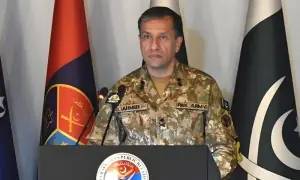UNHCR deputy calls on Bilawal for Afghan refugees
3 min readISLAMABAD: The United Nations High Commissioner for Refugees’ (UNHCR) Deputy High Commissioner Kelly T. Clements concluded his visit to Afghanistan and Pakistan and urged support to address the humanitarian needs.
Kelly T. Clements visited Afghanistan and Pakistan this week to focus attention on the dramatic humanitarian situation facing Afghans and the need to continue to support displaced people, including host communities, refugees and returnees, and women and girls.
Inside Afghanistan, UNHCR with partners works to assist some 3.5 million displaced by conflict, and provides crucial aid to help meet the needs of vulnerable people, including targeted reintegration support to many of the millions of refugees who have returned over the years, says a press statement issued by the UNHCR on Saturday.
“UNHCR continues to support Afghanistan, as it has for 40 years, but is now intensively trying to support internally displaced, returnees and refugees, including by expanding its presence throughout the country.”
During her four days in Afghanistan, the UNHCR’s deputy chief met with interim officials and visited Herat Province, in the west of the country. She inaugurated a women’s business centre - a facility for women-run firms including kiosks for various shops as well as computer literacy, English language training, and counselling resources.
Clements sat with women and girls in meetings in Herat and Kabul and heard their concerns, highlighting the need for an inclusive human rights-based approach to support voluntary return and sustainable reintegration.
“The women (in Afghanistan) are extremely resilient. They talked about education. They talked about the need for livelihoods. They talked about wanting to be a part of public life in Afghanistan. They want to educate their girls, to be a part of shaping the future of the country,” Clements said.
Since last August, Afghanistan’s women and girls have increasingly experienced limits on their access to education, ability to freely move without a male relative, and requirements to wear face coverings. Girls have been prevented from attending school above year six in most of the country.
So far in 2022, UNHCR has provided cash, winter support, shelter materials and other household assistance to nearly one million vulnerable Afghans. UNHCR’s $340 million appeal for its Afghanistan operations is only 57 per cent funded, while the Humanitarian Response Plan for $4.4 billion, has received only 32 per cent.
In Pakistan, the Deputy High Commissioner highlighted the precious right to asylum and thanked the people and government for generously hosting millions of Afghans for more than 40 years. Pakistan now has some 1.3 million registered refugees, and 1.5 million Afghans of undetermined status, which includes some 250,000 Afghans who have arrived since August 2021 according to the government.
The Deputy High Commissioner met with Pakistan’s Foreign Minister, Bilawal Bhutto Zardari, and Minister of States and Frontier Regions, Muhammad Talha Mahmood, among other officials. Her discussions focused on the need for peace in Afghanistan and lasting solutions for the refugee population in neighbouring countries.
Clements welcomed the ongoing commitment of Pakistan to register the births of refugee children and issuing birth certificates and the provision of more than 1,700 university places to ensure that Afghans can access to advanced studies.
The Deputy High Commissioner encouraged Pakistan to remain steadfast in its attention to Afghans in exile and called for strengthened international support.
“Afghans need to see they are not alone and that the international community stands with them, and appreciates Pakistan’s enduring willingness to include refugees in its communities and services,” Clements said.
Clements traveled to Haripur in Khyber Pakhtunkhwa Province, where she met with Afghans, including girls and women, in a refugee village established in 1979, and noted their strength and determination to shape their own futures and contribute to their communities.
For the latest news, follow us on Twitter @Aaj_Urdu. We are also on Facebook, Instagram and YouTube.






















Comments are closed on this story.